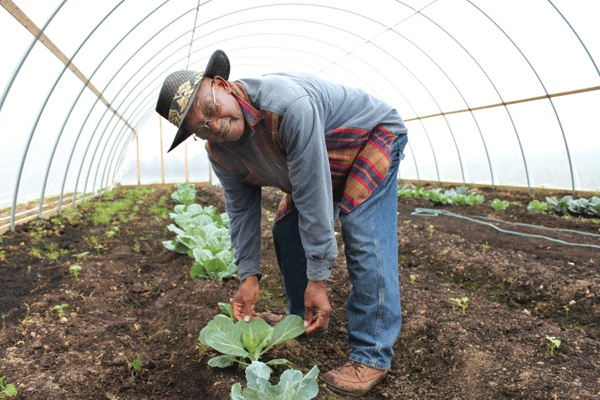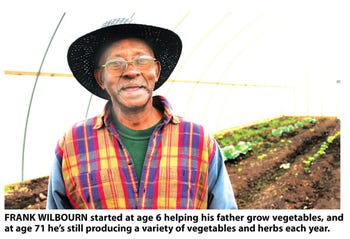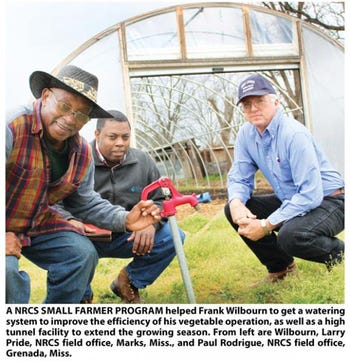
Seventy-one year old vegetable grower Frank Wilbourn no longer has to snake soaker hoses over his fields to water his crops, thanks to a well and underground distribution lines he was able to obtain through a USDA/NRCS program. He also has a new plastic-covered high tunnel facility, or “hoop house,” that allows him to start plants earlier in the spring and continue them later in the spring.

Seventy-one year old vegetable grower Frank Wilbourn no longer has to snake soaker hoses over his fields to water his crops, thanks to a well and underground distribution lines he was able to obtain through a USDA/NRCS program.
He also has a new plastic-covered high tunnel facility, or “hoop house,” that allows him to start plants earlier in the spring and continue them later in the spring.
The irrigation system “has been a blessing in helping to water the things I grow, especially last summer when it was so dry and hot,” he says.
 Wilbourn, whose pickup bears a bumper sticker, “No Farmers, No Food,” was able to qualify for cost-share assistance through the USDA’s Natural Resources Conservation Service Small Farmer program, says Larry Pride, soil conservation technician, at the agency’s Marks, Miss., field office.
Wilbourn, whose pickup bears a bumper sticker, “No Farmers, No Food,” was able to qualify for cost-share assistance through the USDA’s Natural Resources Conservation Service Small Farmer program, says Larry Pride, soil conservation technician, at the agency’s Marks, Miss., field office.
“One of the objectives is to provide assistance to non-traditional farmers to help promote locally-grown alternative crops, such as fruits and vegetables, and one of the ways to do that is to help them with small irrigation systems that will improve efficiency and enhance productivity.”
The program has been expanded to include historically underserved clients that the mainstream USDA programs typically don’t reach, says Paul Rodrigue, NRCS water management engineer at the Grenada, Miss., field office.
 “These include limited resource farmers who meet certain financial conditions, socially disadvantaged farmers, such as African Americans, and beginning farmers (those who’ve been farming less than 10 years).
“These include limited resource farmers who meet certain financial conditions, socially disadvantaged farmers, such as African Americans, and beginning farmers (those who’ve been farming less than 10 years).
“We provide the design/engineering for the projects and assistance with the application process. The farmer works with a contractor for installation, and after the work is complete, we inspect it to be sure it meets the contract specifications and then approve payment.”
The amount of financial assistance varies according to the project and the individual circumstances, he notes.
In addition to small irrigation systems, assistance is available for erection of high tunnel facilities that can extend the growing season for vegetables and other crops and further incentivize locally-grown food.
“These aren��’t greenhouses,” Rodrigue notes. “They have no heating or cooling — but are simply plastic-covered structures that enable a grower to get plants in the ground 30 days early in the spring and to maintain production 30 days later in the fall.
Funds through these programs are already committed for Mississippi for 2011, he notes, and applications for assistance would be for 2012.
Frank Wilbourn had already been producing fruits and vegetables for years, but needed a way to more efficiently distribute water to his fields.
Under the NRCS program, he was approved for a well/pumping system and underground lines with hydrants to distribute water in the field. He already had one hoop house on the property, but last year a second one was added through the USDA program.
"I love seeing things grow"
Wilbourn, who was born here in Quitman County, Miss., says his love for growing things started when he was six years old, helping his father with vegetable production.
“I just loved seeing things grow — putting seeds in the ground and tending them to produce food. In those days, everyone had a garden and grew a lot of their own food. We didn’t go to the grocery store for everything.”
In the 1960s, he says, “Things were really tough in this area; there just weren’t any jobs. I went to Milwaukee, Wisc., and worked in the steel mills. It was hard, exhausting work, but even there, I had gardens to help feed my family — we had six children.”
In 1990, he returned to Mississippi, bought his parents’ place where he had grown up, and began growing vegetables again.”
“Everybody knows Mr. Frank,” says Larry Pride, “and they know the quality of his vegetables. He doesn’t have any problem selling everything he produces.”
“I grow vegetables of all kinds,” Wilbourn says. “Red potatoes, white potatoes, spinach, kale, string beans, butter beans, eggplant, onions, tomatoes, sweet peas, okra, turnips/greens, squash, watermelons, muskmelons, and whatever else I decide on in any given year. And a lot of herbs — rosemary, thyme, basil, parsley, and others.”
He sells to local area residents and also at farmer markets at nearby Clarksdale and Batesville.
“But I give away a lot of stuff, too,” Wilbourn says. “Times are tough and there are a lot of needy folks. Where I can help, I do. There are folks who come out here and help me do things in exchange for vegetables, and I welcome them.
“This is a talent the Lord has blessed me with and it helped me to better take care of my family and to lend a hand to others who were less fortunate.
“Folks today have become so citified they’ve forgotten how to grow things,” Wilbourn says. “If everybody could just grow 5 percent to 10 percent of their own food, it would really make a difference. Too many people have forgotten that the earth is there to help us survive.
“I’m 71 years old, and except for surgery to remove some tumors, which thank the Lord weren’t cancer, I’m still out here every day, planting things and watching them grow.
“I love what I do — when I’m out here working, the problems of the world just fade away. I pray while I work and thank God for all the blessings He has given me and that He is still allowing me, as best I can, to help others.”
About the Author(s)
You May Also Like



